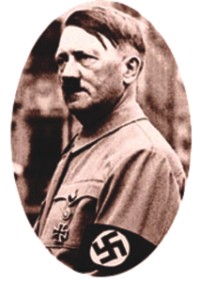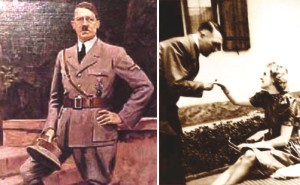|
In Retrospect
The Last Four Days of Adolph Hitler
Azizul Jalil
“After my death, I don't want to be put on exhibition in a Russian wax museum.”
“I will not fall into the hands of the enemy dead or alive. If I die, my body shall be burned and so remain undiscovered forever.”
Hitler at the bunker, April 29, 1945
 In a long army coat, Hitler-stooped with the burden of utter defeat in the war and worry about falling in the hands of the Russians, came out of the bunker under the German Chancellery. He was visibly shaking in nervousness as shells were falling every few minutes nearby with deafening sound. It was April 27, 1945. His underground hideout and most of Berlin were defended by rag tag elements of various German divisions. In the last few days, even boys as young as twelve were hurriedly conscripted to defend the city. The Fuhrer wanted to commend them for their bravery and loyalty, and decorate them with medals. As he put an Iron Cross on one of them, the exhausted boy-soldier went to a corner near a wall, crumpled to the floor falling fast asleep. The day before, he had daringly blown up a Russian tank. In a long army coat, Hitler-stooped with the burden of utter defeat in the war and worry about falling in the hands of the Russians, came out of the bunker under the German Chancellery. He was visibly shaking in nervousness as shells were falling every few minutes nearby with deafening sound. It was April 27, 1945. His underground hideout and most of Berlin were defended by rag tag elements of various German divisions. In the last few days, even boys as young as twelve were hurriedly conscripted to defend the city. The Fuhrer wanted to commend them for their bravery and loyalty, and decorate them with medals. As he put an Iron Cross on one of them, the exhausted boy-soldier went to a corner near a wall, crumpled to the floor falling fast asleep. The day before, he had daringly blown up a Russian tank.
The German army was in retreat in all fronts before the inexorable march of the allied armies led by the US from the west and the Soviet army from the east. Hitler, with his closest associates and Eva Braun, his mistress, had moved to a heavily fortified bunker. The buildings in the area around the bunker had been transformed into rubble by Russian bombs and artillery shells. In the race to capture the prize-Germany's capital Berlin, the Russians whom Hitler feared and hated most were ahead. They were about to enter the city and Hitler's capture was imminent. The following is an account of the last days in Hitler's life. It is based primarily on Oxford historian and British military intelligence officer, Hugh Trevor Roper's book, “The Last Days of Hitler” (1947), and John Toland's book, “Adolf Hitler” (1976).
News of the defeat and surrender of vast German armies was pouring in. Hitler was despondent and feeling betrayed by his generals. He was issuing frantic and unpractical orders to armies that no longer existed at a time when equipment, ammunition, air cover and army morale were at lowest level. His second- in- command, Air Marshall Goering was in Berchtesgaden near the Austrian border. He was trying on his own to sound out the Allied powers to negotiate a deal and surrender. Himmler, his trusted chief of the feared black shirted Nazi party force- SS, had secretly sent feelers via Swedish authorities to surrender to the Americans and save his life. Treachery by his most favourite lieutenants broke Hitler's faith and confidence. Of the top Nazi leadership, Goebbles with his family and Bormann were in the bunker with Hitler until the end, though they themselves realized the futility of any move to resist or trying to escape from the ever-tightening encirclement by the enemy.
On April 28, two bits of information arrived, which gave some hope. One was that German troops under General Wenck, coming from the north to break through to Berlin was making some progress against all odds. The other news was a supposed disagreement cropping up between the US and the Russians about the post-war control of Berlin. In the circumstances, Hitler, who had decided to write a testament for succession in the state and the armed forces before ending his life postponed it. After conferring with his aides and instructing that he be not disturbed unless a Russian tank arrived just outside the bunker door, the Fuhrer went down to his suite.
On April 29, cables indicated that there was no chance of a breakthrough by Wenck's forces and rescue of Berlin by his army could not be expected. If there was any disunity among the powers invading Germany, there was no sign either in the last twenty-four hours of that affecting the outcome of the war. Hitler also received the news of the death of the Italian fascist dictator and his ally in the war, Benito Mussolini at the hands of partisans. He was now ready to dictate his political testament and personal will to one of the secretaries in the bunker. He appointed Admiral Karl Doenitz as Reich President and Supreme Commander of the Armed Forces and Goebbles as Reich Chancellor, to be effective after his death. These were typed and Hitler signed it with Goebbles and Bormann and two other persons signing as witnesses. The personal will included the following: “My wife and I choose to die in order to escape the shame of overthrow or capitulation. It is our wish that our bodies be burnt immediately in the place where I have performed the greater part of my daily work during my twelve years' service to my people.” To help guarantee their delivery to Doenitz, arrangements were made by Bormann to send the documents by two separate emissaries.
According to the Fuhrer's wish, a simple ten-minute ceremony was held in the bunker for his marriage with Eva Braun. Hitler said that all his life he was too busy with work to marry. At the very end, he wished to honor and reward Eva, by formally taking her as his wife. She had taken grave risks by staying on with him in the bunker until the end. The couple and their inner circle celebrated with champagne. Knowing that a dangerous and uncertain fate awaited them, it seemed all very unreal. The couple then went down the curved stairs to their suite.
 |
Adolf Hitler and Eva Braun |
When they got up late the next day- April 30, one Russians advance unit was reported in the street next to the bunker. The fall of the bunker in their hands was imminent. It was the couple's final hour. Hitler, looking pale and with tears in his eyes, shook hands with everyone-thanking and at the same time saying a final good bye. While he was bidding farewell to Baur, his personal pilot of many years, the latter begged Hitler to escape by plane to Argentina or to Japan. But Hitler would not listen and replied, “I am all ending here.” Both Eva and Hitler had decided to commit suicide by revolver but toward the end, Eva did not feel up to it. Cyanide capsules were brought in and to test their effectiveness, it was put in the mouth of Blondie, the couple's dog. The dog died instantly. The door was then closed and the aides waited in a room down the hall. After a little while, a shot was heard from the room and they went in to check. The fifty-six year old Hitler was found on the couch sprawled face down across a low table. He had a tiny hole on his right temple and there was blood on his cheek and on the carpet. To his left lay Eva, slumped over the armrest, her lips pressed together in a final spasm and nostrils discoloured by cyanide.
Hitler's staff had already collected gasoline by siphoning it from the wrecked cars in the Chancellery. The bodies were taken out of the bunker to the Chancellery garden, and put in two deep bomb craters side by side. Gasoline was poured over the bodies and lighted. They were burnt beyond recognition leaving only the charred skeletal remains, which were buried the same night in the garden. It was a pathetic and ignominious end of a megalomaniac Fuhrer, who considered the cruel subjugation of other countries and systematic annihilation of the Jewish people as his glorious achievements.
Azizul Jalil writes from Washington. Copyright
(R) thedailystar.net 2008 |
|
